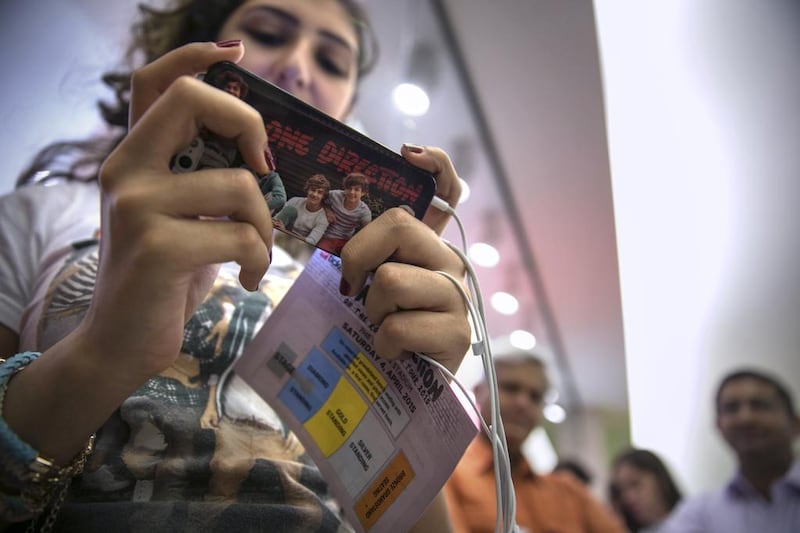Generation Z is very different from its older siblings, so we should not just lump anyone under the age of 35 together as millennials, according to the creative media agency UM Mena.
We would also do well to remember that Generation Z – those born after the year 2000 – is very different culturally in the Middle East to the West, says UM Mena’s strategy manager, Melissa Moubarak.
“If you remember a time when you didn’t have a personal computer at home, you’re not Generation Z,” says Ms Moubarak, who shared her insights at the Dubai Lynx advertising festival last month. “If you remember the transition from analogue to digital, you’re not a ‘Gen Zer’.
“If you came of age with social media, then you’re Generation Y. Generation Z is the first generation born in a world where you did not have to hear the screeching sound of a dial-up internet connection.”
This is why they have been dubbed screenagers.
The term millennials first came from a 1989 study by sociologists Neil Howe and William Strauss to define the generation born after 1982.
Generation Y was a term coined in a 1993 Advertising Age column and is widely understood to mean the same as millennial – but the cohort making up Generation Z are generally still teenagers today.
In the Middle East, the young (defined as under 24) comprise a staggering half of the regional population – double that in the US or UK – according to Dubai Press Club’s Arab Media Outlook report.
Many international brands have “faltered” in trying to communicate with teenagers, says Ms Moubarak, by either trying to bring in too much of a “western brand of edginess” or by being “very conservative”.
Today’s Arab teens are “a lot more liberal than most of the societies they live in” but with “flashes of rebellion”, she says – “a dash of purple lipstick” or “a hidden tattoo”, but more often seen in the virtual world.
UM Mena’s Generation Z study – stitched together from digital cookie crumb analysis, surveys, focus groups and interviews – shows that 83 per cent of this age group want to be accepted by society but three-quarters still want to stand out.
It also showed that 10 per cent of teens in the region check their phone every 10 minutes – and almost a quarter of this introverted group said they would prefer never to communicate face to face. Instead they are turning to social media channels Snapchat, Instagram and YouTube, but are less likely to use Facebook than older generations, UM Mena finds.
According to the 2016 social media survey by the UAE’s Federal Competitiveness and Statistics Authority, social media usage in the country was highest among 18 to 21-year-olds, with the most popular channel messaging service WhatsApp. When it came to Emiratis, 96 per cent used WhatsApp, with 78 per cent using Instagram and 62 per cent Snapchat. Facebook – used by 93 per cent of other UAE residents – was, at 58 per cent, the least popular channel for Emiratis.
The Saudi mountaineer Raha Moharrak, the youngest Arab to climb Mount Everest is, at 32, firmly in the Generation Y camp. She says the younger generation is “spoon-fed” information and, while not lazy, “everything has to be now”. “The more this generation gets spoiled, the more there is a huge gap between their generation and ours,” she adds.
Yet the 25-year-old Emirati vlogger Futaim AlFalasi, whose #AskTaim YouTube channel has had almost 80 million views and who has 2.3 million Instagram followers, says she has been “shocked” at her fans’ staying power: many of her YouTube videos run to 40 or 50 minutes and her first vlog was 90 minutes long.
Both Ms AlFalasi and Ms Moharrak have earned money as social media influencers, but Ms Moharrak – who splits her time between Dubai and Jeddah – warns that brands need to work to find the right influencer for their product, and to find “new blood” instead of knocking “on the same four doors every time”.
Ms AlFalasi says she can tell the age of her fans by how they post – if they use text and “a million hashtags” or, when they are younger, videos, pictures and emoji. “They are a lot more visual in the way they communicate,” she says, “and they are picky with hashtags. I only use hashtags on advertising [posts] when companies want to track them.”
Snapchat, which opened its first Middle East office in Dubai this year, does not rely on hashtag use and Sherif Ghanem, media and connections manager for Coca-Cola in the region, says it has “come out of nowhere in the past few years”.
As Generation Z has grown up with information a click away, he says, marketers need to think carefully about how to target them. Communications should not be “dumbed down” but do need to be relevant to grab their attention in just a few seconds.
Teenagers are very brand-conscious, adds Ms Moubarak – and they are “acutely aware” of their own brand in the digital spotlight. “Generation Z are the masters of navigating the complicated route of defining who they are.”
business@thenational.ae
Follow The National's Business section on Twitter





